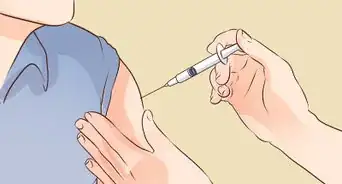This article was co-authored by Trudi Griffin, LPC, MS. Trudi Griffin is a Licensed Professional Counselor in Wisconsin specializing in Addictions and Mental Health. She provides therapy to people who struggle with addictions, mental health, and trauma in community health settings and private practice. She received her MS in Clinical Mental Health Counseling from Marquette University in 2011.
There are 10 references cited in this article, which can be found at the bottom of the page.
This article has been viewed 43,438 times.
Anger is a natural mechanism for coping with stress. However, excessive anger or problems controlling one's anger can be signs of an underlying mental disorder and can negatively impact one's social or professional life. Learning how to cope with anger in a responsible and constructive manner can drastically improve friendships, family relationships, and work relationships as well as reduce stress which can lead to other physical health problems.[1]
Steps
Identifying the Sources of Your Anger
-
1Be aware that you are getting angry. For many people dealing with anger issues, the fact that they are too quick to become angry or express themselves with anger in situations that do not call for it is often lost on the individual. So, it can be useful to listen to others' opinions of your behavior, as it is often easier for someone else to identify when you are getting angry than it is gauge your own manifestations of anger. The first step in addressing an anger issue is to realize that you have one.[2]
- Along with learning to recognize when you are getting angry, learn how to recognize when your anger is progressing. You may notice that your anger goes through stages from annoyance to frustration to anger to rage.
-
2Identify the physical manifestations of anger. Anger manifests itself in many ways, but is also accompanied by a handful of physical changes in your body that can help you know when you are getting angry. Some physical signs of anger are:
- An increase in blood pressure and pulse.
- General redness in the face, or a hot feeling in the neck/face area.
- Clenching your jaws or grinding your teeth.
- The rapid onset of a headache or stomach ache.
- An increase in sweating, especially your palms.
- Shaking or trembling.
- Dizziness.[3]
Advertisement -
3Identify the emotional manifestations of anger. Emotional markers also indicate the onset of anger in an individual. Some of the emotional signs to watch for are:
- Feeling like you want to get away from the situation.
- Feeling irritated, sad or depressed.
- Feeling guilty, resentful or anxious.
- Feeling like you may need to lash out verbally or physically.[4]
-
4Identify changes in your behavioral pattern. Anger is accompanied by a handful of changes in one's behavioral patterns as well. Some behavioral changes to watch out for are:
- Rubbing your head excessively.
- Cupping your fist with your other hand.
- Pacing.
- Engaging in mean-spirited sarcasm.
- A sudden loss of your sense of humor
- Acting in an openly abusive or abrasive manner.
- Craving a drink, a smoke or other substance that relaxes you.
- A sudden raising of your voice or beginning to yell, scream, or cry.[5]
-
5Ask questions of your anger. As anger is often a first response to any stressful situation for people with anger management problems, it is often useful for you to ask yourself, “Why am I angry?” Many times you will find that a situation in which you have expressed anger as a first reaction does not call for an angry response and, when you have examined the situation carefully, you will realize that anger is not helping the situation or providing any real solution.[6] [7]
-
6Examine the possibility of control issues. Many times, people with anger management issues do not actually have a problem with anger, but rather a lack of control. It is undeniably stressful to have to cope with a situation over which you have little to no control. However, angry reactions will not change the level of influence you have on a situation and, more often than not, can exacerbate the stress-levels that are incumbent with such situations- leading to greater levels of anger.[8]
-
7Examine the possibility of other mental health disorders. Overwhelming feelings of anger in situations that do not call for it can often be signs of an underlying psychological or psychiatric disorder. Bipolar disorder, schizophrenia, and dissociative identity disorder are but a few psychological conditions that can lead one to react with anger. These conditions can be managed with medical or professional help and are cause to see doctor or therapist.[9]
- It is important to note that these conditions are relatively rare, affecting only about 43 million people in the United States, or about 18% of the total population. While considering the possibility of a mental disorder is relevant to controlling your anger, it is far more likely that you have anger management problems rather than a psychiatric disorder.[10]
- Also keep in mind that associative identity disorder and schizophrenia usually manifest themselves in far more severe ways than simple outbursts of anger.
-
8Understand that your environment is influential. Your anger management issues may be a result of your environment. However, before you can remove yourself from situations that make you angry, you need to be aware of the environmental factors that trigger your anger and know that others' responses to your anger can often lead to you becoming even angrier.[11]
-
9Gain some perspective. Once you realize that you have an anger management issue, look back on situations where you have responded to stress with anger. Did becoming outwardly angry relieve your stress? Did responding with anger alleviate the actual source of or fix the issue that was making you angry? For well-balanced and grounded individuals, the answers to these questions are usually “No.” Stepping back for a moment and gaining some perspective should allow you to see that your anger solved nothing. It was not successful in relieving you of your stressful feelings and the situation that made you angry in the first place is rarely resolved with anger. With this being the case, you may be able to substitute another reaction for the anger you are used to conveying.[12]
Cultivating Coping Mechanisms for Dealing with Anger
-
1Delay your reactions. As stated above, people with anger issues often rely on anger as a first reaction to any source of stress or frustration. One useful method of controlling or coping with your anger can be deliberately delaying any reaction you have to a situation. This delay will give you time to compose yourself before outwardly expressing anger towards those around you. [13]
- Many people use a method of counting to ten before they react to a stressful situation to ensure that they have had time to process the information they have just encountered and can offer an appropriate or measured response.[14]
-
2Alleviate the sources of anger temporarily. If you are just now realizing that you are becoming angry too quickly or too often, there is a good chance that you are not a naturally angry person, but are just temporarily coping with a situation that is making you angry. Taking a vacation or some personal time off can contribute to lowering your overall stress level. Once you have taken this temporary leave, you can often come back to the situation that makes you angry with a new outlook and a greater level of composure. This should help to quell your expressions of anger.[15]
-
3Identify and avoid triggers of anger. Sometimes, a person who often gets angry is simply reacting to consistently frustrating social or professional interactions. For example, you may be angry much of the time because you are working in a stress-filled situation or have surrounded yourself with people whose views, opinions or actions make you angry. If this is the case for you, it can be helpful to know that you are not an angry person, but have willingly put yourself in situations that make you angry.[16] People are different and they have different thresholds of tolerance under various circumstances. If you work in a high-stress job and are consistently angry as a result, it can be beneficial to find a different line of work. If you are constantly upset or angry with the way your friends and family behave or voice their opinions, it may be time to separate yourself from those people and surround yourself with people who behave or think in manner that seems more appropriate or palatable to you.[17]
-
4Think positive. An important method to coping with anger is to realize that there is more to living than voicing your displeasure with frustrating situations all the time. Your life should be a pursuit of happiness. When you begin to get upset, take solace in the things that make you truly happy.[18]
-
5View yourself through others' eyes. A useful mechanism for coping with your anger is to reflect on how you would deal with your own reaction if you were someone else by putting yourself in the shoes of the person who had to react to your angry outburst. You may realize that your response was not appropriate, and that you may have wanted to handle the situation more positively.[19]
-
6Exercise or do yoga. You may find engaging in physical activities, such as running, tennis, or yoga, help alleviate the frequency and level of anger you feel in social and professional settings. Expending your energy in other ways on a regular basis may make you less prone to angry or emphatic outbursts.[20]
-
7Open better lines of communication. Sometimes, getting angry can be the result of incessant miscommunication with others. If you work on cultivating better communication techniques, you may find that your day-to-day interactions with others is less frustrating, leading to fewer outbursts of anger.[21]
-
8Practice meditation. Meditation has been shown to have positive short-term effects on emotional processing. In addition to having an effect on physical relaxation and a sense of peacefulness, a Harvard study has shown that mindful meditation increased grey matter density in areas of the brain related to learning, memory, self-awareness, compassion, and introspection.[22]
-
9Use humor to diffuse tense situations. If you find yourself in a situation that is frustrating, try using silly humor to lighten the mood. Making fun or lighthearted jokes can bring down your tension levels, as well as the tension levels of those around you, making your social interactions much less likely to escalate to a point where you feel the need to become angry.[23]
Attending Anger Management Classes
-
1Be aware that some people need help controlling anger. If simple coping mechanisms prove ineffective in dealing with your feelings of anger and fail to stop you from reacting angrily, your problem may not be something you can fix on your own. A plethora of books and websites provide techniques for controlling your anger, but you may find you need additional, face-to-face assistance when it comes to coping with your anger.[24]
-
2Find local anger management groups. Anger management is not a problem from which you alone suffer. There are likely many groups in your area that can provide you with support in dealing with your anger issues. Research and identify the types of groups that you feel will be the most beneficial for you. Sometimes these groups are composed of regular people like yourself who have problems controlling their anger. Others are headed by licensed professionals. Some of the groups are free and open to the public while others are fee-based and exclusive to certain members of the community. Find a group that is right for you. Searching online, consulting with a doctor or asking a friend or colleague who has had similar issues are all great ways to help you identify legitimate anger management resources in your area.[25]
-
3Attend anger management sessions. Coming together with individuals who suffer from the same anger management problems as you will provide you with tangible methods for coping with your anger. These groups can also provide a safe place for you to express your feelings of anger in a nurturing and understanding environment. Finally, the support of a group can help you devise and stick to an anger management routine or plan. Anger management sessions provide specific techniques or ways of thinking that help you minimize and control your anger. While books and online resources provide general solutions for anger management, these sessions can help you develop and tailor an anger management routine that is specific for your needs.[26]
-
4Continue attending support groups. Even after you have seen some improvement in dealing with your anger issues, it is possible to relapse and fall back into to negative patterns of behavior or thinking. That is why it is critical to attend anger management classes regularly, even after you have begun to employ methods for controlling your anger.[27]
- There is no established time frame for ending your anger management sessions. While there may be a point when you feel you don't need them anymore, you should allow a trained professional to tell when it is safe to stop attending.
-
5Practice what you've learned in your anger management sessions. Anger management classes, groups or sessions provide you with the framework for dealing with stress in your day-to-day life. It is up to you to put these theoretical methods into actual practice. Employ the techniques you acquired in anger management in real life situations and gauge the end results of utilizing these techniques. When you know how these techniques work or don't work for you in real life situations, anger management sessions can help you find alternative solutions or reinforce the techniques that do work. So, be prepared to put what you have learned into use and report the results in your anger management sessions to achieve the most favorable outcome.[28]
-
6Assist others with their problems. Anger management classes are not just for you. You may find that, after attending these classes or groups for some time, you are equally capable of helping those people with similar problems. Not only does this help the other individuals in your group, but will also lend some perspective to your own anger management issues.[29]
Utilizing Therapy to Deal with Underlying Problems
-
1Understand when therapy is necessary. If you are considering therapy with a licensed professional to help cope with your anger management problems, it is likely that you have tried some other avenues in dealing with your anger. You need to know when individual coping mechanisms or group sessions are not effective and seek help from a respected therapist.[30]
-
2Research therapists in your area. Therapists, like others in the medical professionals, focus on various areas of specialization. While a general therapist who will allow you to talk out your problems can be helpful, it is important to identify therapists who have experience in treating anger management problems. Also, it is critical to vet the credentials and client satisfaction of the therapists in your area to ensure that the therapist you select is the right one for you. [31]
-
3Set aside resources and time for therapy. Therapy with a licensed professional is often an ongoing process that can last for years or even a lifetime. Make sure you have accounted for the money and the time needed to dedicate to therapy. Like many issues that require a therapist, your problem may never disappear, but you can manage it.[32]
- Also, be aware that local, state and national resources exist for offsetting the cost of therapy for those who need it, but can not afford it. Check with your state department of health and human services to see what resources exist for offsetting the costs of therapy.[33]
-
4Be open to various explanations of why you are angry. When you seek out a licensed therapist, be prepared to deal with some unpleasant episodes in your life and be open to the therapist's explanation of your problem. You may find that you learned inappropriate anger-coping mechanisms when you were a child or that you suffer from underlying mental disorder that causes your expressions of anger. It is critical when meeting with a therapist that you are open and accepting of the explanations they may provide to you. You wouldn't want to waste your time and money seeing a therapist for help only because you were unwilling to engage or tell him/her the full truth.[34]
-
5Follow the therapist's instructions and treatments. After meeting with a therapist for some time, he or she may decide you need to adhere to certain practices or methods to control your anger. You must follow through with a therapist's suggestions to ensure the therapy is as beneficial as possible. Furthermore, you may find that you need certain medications if the source of your anger is an underlying mental disorder. If this is case, take any and all medications as they are prescribed and do not deviate from the dosing schedules.[35]
- Again, be aware that these conditions are relatively rare among the general population.
- One of the biggest problems facing individuals with mental disorders is that they begin to feel “better” or “okay” after taking their prescribed medication. This, in turn, leads them to believe that they no longer need the prescribed medication and they stop taking it. In these circumstances, the symptoms of the mental disorder can become drastically worse without the afflicted individual realizing it.
- Of course, you are always free to seek out a second opinion or stop taking medication that you do not feel is effective or right for you. It is your choice, but be aware of the potential consequences.
References
- ↑ http://www.apa.org/topics/anger/control.aspx
- ↑ http://www.helpguide.org/articles/emotional-health/anger-management.htm
- ↑ https://www.mentalhelp.net/articles/recognizing-anger-signs/
- ↑ https://www.mentalhelp.net/articles/recognizing-anger-signs/
- ↑ https://www.mentalhelp.net/articles/recognizing-anger-signs/
- ↑ http://www.helpguide.org/articles/emotional-health/anger-management.htm
- ↑ http://www.apa.org/topics/anger/control.aspx
- ↑ http://www.apa.org/topics/anger/control.aspx
- ↑ http://www.apa.org/topics/anger/control.aspx
- ↑ https://www.nami.org/Learn-More/Mental-Health-By-the-Numbers
- ↑ http://www.mayoclinic.org/healthy-lifestyle/adult-health/in-depth/anger-management/art-20048149
- ↑ http://www.apa.org/topics/anger/control.aspx
- ↑ http://www.apa.org/topics/anger/control.aspx
- ↑ http://www.apa.org/topics/anger/control.aspx
- ↑ http://www.apa.org/topics/anger/control.aspx
- ↑ http://www.helpguide.org/articles/emotional-health/anger-management.htm
- ↑ http://www.helpguide.org/articles/emotional-health/anger-management.htm
- ↑ http://www.apa.org/topics/anger/control.aspx
- ↑ http://www.helpguide.org/articles/emotional-health/anger-management.htm
- ↑ http://www.apa.org/topics/anger/control.aspx
- ↑ http://www.apa.org/topics/anger/control.aspx
- ↑ http://news.harvard.edu/gazette/story/2011/01/eight-weeks-to-a-better-brain/
- ↑ http://www.apa.org/topics/anger/control.aspx
- ↑ http://www.mayoclinic.org/tests-procedures/anger-management/basics/how-you-prepare/prc-20014603
- ↑ http://www.mayoclinic.org/tests-procedures/anger-management/basics/how-you-prepare/prc-20014603
- ↑ http://www.mayoclinic.org/tests-procedures/anger-management/basics/how-you-prepare/prc-20014603
- ↑ http://www.mayoclinic.org/tests-procedures/anger-management/basics/how-you-prepare/prc-20014603
- ↑ http://www.mayoclinic.org/tests-procedures/anger-management/basics/how-you-prepare/prc-20014603
- ↑ http://www.mayoclinic.org/tests-procedures/anger-management/basics/how-you-prepare/prc-20014603
- ↑ http://www.apa.org/topics/anger/control.aspx
- ↑ http://www.apa.org/topics/anger/control.aspx
- ↑ http://www.michigan.gov/mdch/0,4612,7-132-2943_52115-203750--,00.html
- ↑ http://www.michigan.gov/mdch/0,4612,7-132-2943_52115-203750--,00.html
- ↑ http://www.mayoclinic.org/healthy-lifestyle/adult-health/in-depth/anger-management/art-20048149
- ↑ http://www.apa.org/topics/anger/control.aspx
About This Article
To cope with your anger, start by acknowledging that your anger is a problem and identifying when it’s getting out of control. Learn to recognize the physical and emotional signs of anger, such as increased blood pressure, teeth grinding, or feeling irritated, anxious or like you want to lash out verbally or physically. Then, practice deliberately delaying your reactions to situations that make you angry by counting to 10 before you react. If you can, remove yourself from environments that tend to make you feel more tense. For example, if you feel yourself getting angry in a stressful, crowded store, step outside to calm down for a bit. For more tips on coping with anger, keep reading!

































-Step-21.webp)






















































